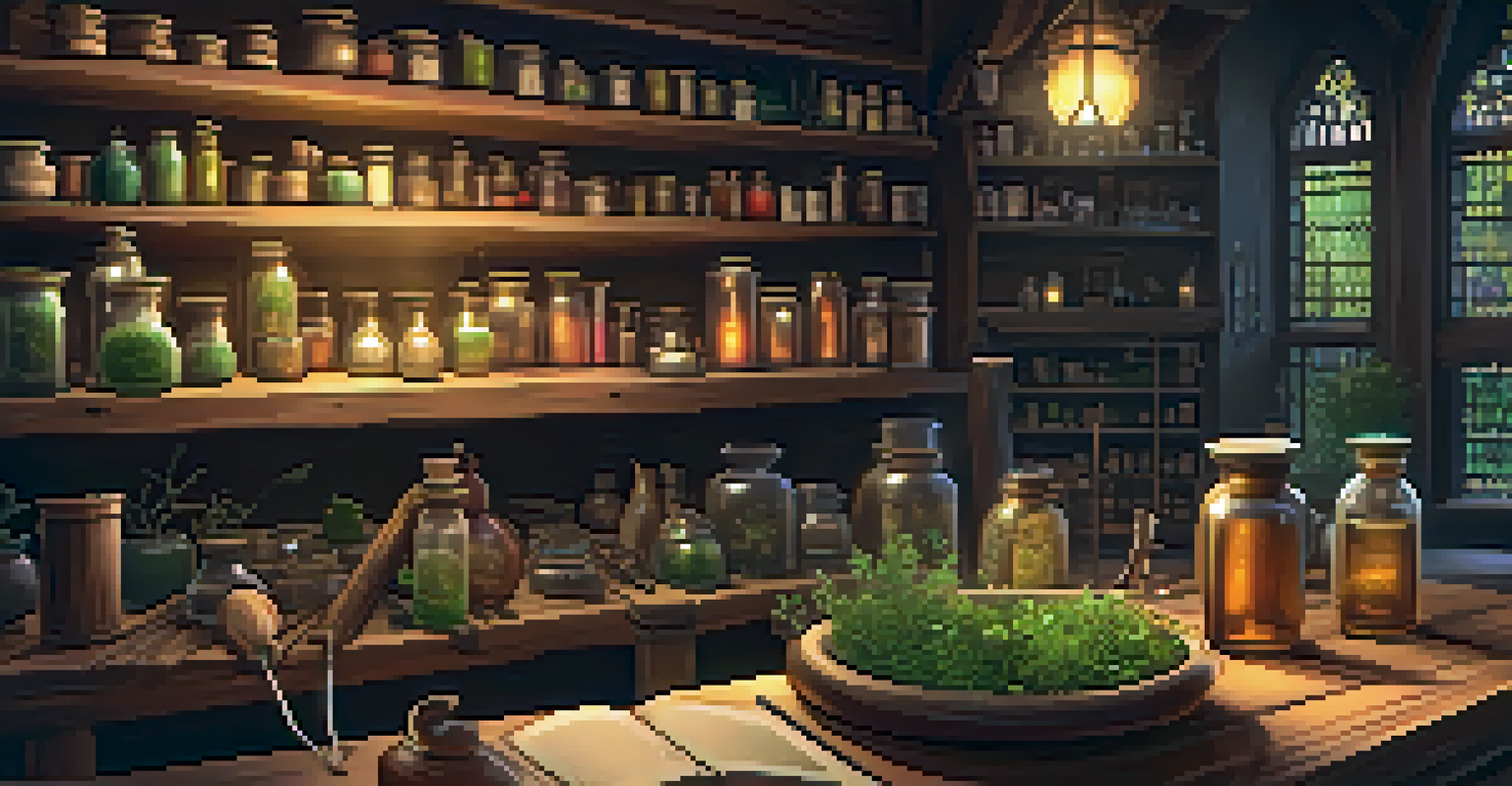Exploring the History of Plant-Based Medicine Through Ages

The Origins of Plant-Based Medicine in Ancient Civilizations
Plant-based medicine has roots that stretch back thousands of years, with ancient civilizations like the Egyptians and Chinese utilizing herbs for healing. These cultures recognized the power of plants to treat ailments and promote health, often documenting their findings on papyrus or bamboo strips. For instance, the Ebers Papyrus from ancient Egypt is a treasure trove of herbal remedies, showcasing their vast knowledge.
The greatest wealth is health.
In ancient China, texts like the 'Shennong Bencao Jing' highlighted the medicinal properties of various plants, laying the groundwork for Traditional Chinese Medicine (TCM). This ancient practice emphasizes balancing the body's energy through herbal treatments, demonstrating an early understanding of holistic health. Such historical documents illustrate a deep connection between humans and nature, showcasing how early healers revered plant life.
As societies evolved, these early practices influenced one another, blending knowledge across cultures. The trade routes established during the Silk Road allowed for the exchange of herbal remedies, enriching various medical traditions. This cultural sharing not only expanded the scope of plant-based medicine but also established it as a vital aspect of healthcare throughout history.
The Role of Plants in Indigenous Healing Practices
Indigenous cultures around the world have long relied on plant-based medicine, often passed down through generations. These communities have developed extensive knowledge of local flora, understanding which plants can heal wounds, alleviate pain, or even treat infections. For instance, the use of willow bark by Native Americans as a pain reliever is a prime example of this profound relationship with nature.

Herbalists and shamans often play crucial roles in these societies, acting as custodians of botanical knowledge. They utilize rituals, stories, and community wisdom to teach others how to harness nature's gifts for healing. This approach doesn’t just treat physical ailments; it also fosters a sense of belonging and cultural identity, making plant-based medicine integral to the community’s fabric.
Ancient Roots of Herbal Medicine
Plant-based medicine has a rich history, with ancient civilizations like the Egyptians and Chinese utilizing herbs for healing and documenting their knowledge.
Furthermore, many modern pharmaceutical drugs trace their origins back to these indigenous practices. The discovery of aspirin, derived from compounds found in willow bark, highlights how traditional knowledge has informed contemporary medicine. This synergy emphasizes the importance of respecting and preserving indigenous healing traditions, as they hold invaluable insights into plant-based treatments.
The Middle Ages: Herbals and the Rise of Apothecaries
During the Middle Ages, the knowledge of plant-based medicine saw a resurgence in Europe with the rise of herbals—books that cataloged the medicinal uses of various plants. These texts became essential for apothecaries, who blended traditional practices with newfound knowledge from the Islamic Golden Age. The translations of Arabic texts into Latin allowed for a greater understanding of herbal medicine, bridging Eastern and Western practices.
Herbs are the friend of the physician and the pride of the chemist.
Apothecaries became the go-to for healing remedies, often mixing herbs into potions and tinctures. They played a pivotal role in public health, providing treatments for everything from common colds to more serious illnesses. Their establishment marked a shift in how society perceived healthcare, moving from a community-based practice to a more specialized profession.
However, this period wasn't without its challenges. The Black Death in the 14th century prompted apothecaries to seek new herbal remedies to combat the plague. This dire situation led to increased experimentation with plants, ultimately contributing to the advancement of botanical medicine and the eventual emergence of modern pharmacology.
Renaissance and the Scientific Revolution's Influence
The Renaissance sparked a renewed interest in science and nature, significantly impacting the study of plant-based medicine. Scholars began to approach herbal remedies with a more systematic lens, emphasizing observation and experimentation. Figures like Paracelsus challenged traditional views by advocating for the use of chemical compounds derived from plants, paving the way for a more scientific approach.
This period also saw the publication of influential texts like 'De Materia Medica' by Dioscorides, which cataloged over 600 plants and their medicinal properties. Such works became foundational in the field of botany and herbal medicine, serving as essential references for practitioners. The blending of art, science, and herbalism during the Renaissance illustrates how interdisciplinary approaches can enrich our understanding of healing.
Modern Revival of Herbal Remedies
Recent decades have seen a resurgence in interest for herbal remedies as people seek natural alternatives, supported by social media and scientific validation.
As curiosity about the natural world grew, so did the exploration of new plants around the globe. The Age of Exploration brought back exotic herbs and spices, expanding the medicinal repertoire available to European healers. This exchange not only diversified treatments but also laid the groundwork for modern botanical studies and the continued evolution of plant-based medicine.
The 19th Century: The Birth of Modern Pharmacology
The 19th century marked a significant turning point in medicine as the field began to embrace the principles of chemistry and experimentation. This era witnessed the isolation of active compounds from plants, leading to the development of modern pharmaceuticals. For example, morphine was extracted from opium poppies, revolutionizing pain management and showcasing the potential of plant-based compounds in medicine.
In addition to chemical advancements, the establishment of professional organizations and regulatory bodies helped standardize the practice of medicine. This shift ensured that herbal remedies were not only effective but also safe for public use. The rise of pharmacognosy, the study of medicines derived from natural sources, further solidified the importance of plants in contemporary healthcare.
However, this newfound focus on isolated compounds sometimes overshadowed traditional herbal practices. While modern pharmacology offered powerful solutions, it also raised questions about the holistic nature of healing that plant-based medicine embodies. The challenge moving forward lies in integrating the best of both worlds to create a more comprehensive approach to health.
The Resurgence of Interest in Herbal Remedies Today
In recent decades, there has been a remarkable resurgence of interest in herbal remedies and plant-based medicine. As people seek more natural alternatives to conventional medicine, herbs like turmeric, echinacea, and ginger have gained popularity for their health benefits. This shift reflects a broader movement toward holistic and preventive healthcare practices, prioritizing overall well-being.
Social media and online platforms have played a crucial role in this revival, providing a space for sharing knowledge and experiences related to herbal remedies. Community forums and influencers have emerged, making information about plant-based medicine more accessible than ever. This democratization of knowledge allows individuals to explore natural treatments, fostering a deeper connection to their health.
Future of Plant-Based Medicine
The future of plant-based medicine lies in harmonizing traditional practices with modern science, emphasizing sustainability and holistic health.
Moreover, scientific research continues to validate the efficacy of many traditional remedies. Studies exploring the benefits of specific herbs for various ailments are on the rise, bridging the gap between ancient wisdom and modern science. This renewed interest encourages a harmonious coexistence of plant-based medicine and conventional approaches, creating a more inclusive healthcare landscape.
The Future of Plant-Based Medicine: A Harmonious Approach
Looking ahead, the future of plant-based medicine lies in finding a harmonious balance between tradition and innovation. As researchers delve deeper into the healing properties of plants, there’s immense potential for developing new treatments that integrate ancient wisdom with cutting-edge science. This synergy can lead to more effective therapies that respect the body’s natural processes.
The growing emphasis on sustainability and environmental health will also shape the future of herbal medicine. As consumers become more conscious of their impact on the planet, there’s a demand for ethically sourced and sustainably harvested herbs. This shift not only supports biodiversity but also encourages practices that honor traditional knowledge and the ecosystems from which these plants come.

Ultimately, the journey of plant-based medicine is one of rediscovery and respect. By valuing both historical practices and modern advancements, we can create a healthcare system that embraces the best of both worlds. As we continue to explore and learn, plant-based medicine will undoubtedly play a vital role in shaping the future of health and wellness.